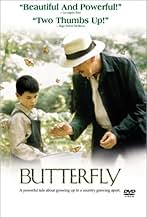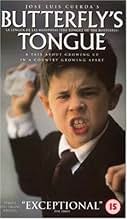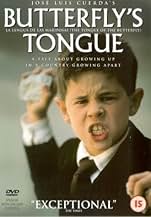Spain, 1936. Moncho is an outcast at school but is able to form a strong bond with his outspoken teacher. When fascism arrives to Spain, his teacher is considered an enemy of the regime.Spain, 1936. Moncho is an outcast at school but is able to form a strong bond with his outspoken teacher. When fascism arrives to Spain, his teacher is considered an enemy of the regime.Spain, 1936. Moncho is an outcast at school but is able to form a strong bond with his outspoken teacher. When fascism arrives to Spain, his teacher is considered an enemy of the regime.
- Director
- Writers
- Stars
- Awards
- 6 wins & 19 nominations total
Elena Bagutta
- Carmiña
- (as Elena Fernández)
Roberto Vidal Bolaño
- Boal
- (as Roberto Vidal)
Antonio Lagares
- Alcalde
- (as Tucho Lagares)
- Director
- Writers
- All cast & crew
- Production, box office & more at IMDbPro
7.610.4K
1
2
3
4
5
6
7
8
9
10
Featured reviews
Sweepingly Beautiful and Poignant
This was a film that really tugged at the heart strings. I really enjoyed the building of characters and the way the lives of the village were portrayed. It was a difficult time politically, yet the simplicity of daily life and family in Galicia was the over-riding story here. The acting is second to none and Manuel Lozano was unbelievably fantastic! I mean these ridiculous "affected" children they get for American movies (i.e. the "Pepsi" girl) are so unbelievable and fake. Manuel is so realistic as Moncho. So are the other actors.
I don't necessarily agree with the way that Cuerda rushed the ending, but I certainly wouldn't want to take away any time in portraying the lives of everyone involved. Maybe he should have made it a little longer as not to rush the ending. Although I will say that one of my favorite things about foreign films is that they are so NOT "Hollywood" that you never really know what to expect. Unlike the trite, unbelievable, over-acted, high budget American films and their overpaid actors which usually just leave a bad taste when I exit from the theatre.
This is an historical piece that absolutely shames "the Patriot". It's so nice to see that a movie doesn't have to change history to show us the past and entertain us at the same time!
I don't necessarily agree with the way that Cuerda rushed the ending, but I certainly wouldn't want to take away any time in portraying the lives of everyone involved. Maybe he should have made it a little longer as not to rush the ending. Although I will say that one of my favorite things about foreign films is that they are so NOT "Hollywood" that you never really know what to expect. Unlike the trite, unbelievable, over-acted, high budget American films and their overpaid actors which usually just leave a bad taste when I exit from the theatre.
This is an historical piece that absolutely shames "the Patriot". It's so nice to see that a movie doesn't have to change history to show us the past and entertain us at the same time!
This is an excellent movie
I give this movie 10 points and even Woody Allen said he liked it. It's a very touching story about a child and his teacher in the period previous to the Spanish civil war. The movie is based on a novel , the screenplay is almost perfect .The performances , specially but one of the best Spanish actors ever Fernando Fernan Gomez as the teacher is amazing and one you will remember for a long long time and the child Manuel Lozano is at the same quality level of performance . I have seen this movie only once and I still remembered it now. José Luis Cuerda , the director , do a very good job and Alejandro Amenabar wrote the soundtrack.The characters are so well constructed you will identify with them. I recommend this movie . Don't miss it .
A gorgeous blend of emotion and politics
It's a beautiful (and too rare) thing to witness a child actor who can avoid the saccharine cutesiness so common to mainstream American child actors. In this film full of children there are, happily, no cloying, exaggerated "cute kid" moments.
The real beauty of La lengua de las mariposas is what's unspoken -- the truths that remain between the lines. The film's political theme is never heavy-handed, and its vivid and fascinating depiction of a turbulent moment in Spanish history has inspired in me a desire to learn more. Without spoiling the ending (which I read as fairly subversive, at least to an American audience), I must say I wasn't entirely surprised at what happened. It brought a tear to my eye and it's still making me think, three days later.
Those who liked this film should also see La Vita e Bella (Life Is Beautiful) and La notte di San Lorenzo (Night Of Shooting Stars), which are similar and may appeal equally, if not more.
The real beauty of La lengua de las mariposas is what's unspoken -- the truths that remain between the lines. The film's political theme is never heavy-handed, and its vivid and fascinating depiction of a turbulent moment in Spanish history has inspired in me a desire to learn more. Without spoiling the ending (which I read as fairly subversive, at least to an American audience), I must say I wasn't entirely surprised at what happened. It brought a tear to my eye and it's still making me think, three days later.
Those who liked this film should also see La Vita e Bella (Life Is Beautiful) and La notte di San Lorenzo (Night Of Shooting Stars), which are similar and may appeal equally, if not more.
My heart ached when I leave the theater
This one was one of the excellent movies I have seen for the last couple of years. It takes you back to 1936, Spanish War in Galicia. Telling the truth I did not know well what happened there exactly . But this movie showed how the war influenced those people who lived in a small town to live their small lives. By the time they showed the ending scene my heart ached. I truly wished that someone could have been here with me to enjoy the afterglow this time. It has not happened to me lately. Plus their way to take this film was exquisite. Every single scene was beautiful and sentimental as if you turn around the post cards stand at the souvenir shop.
Certain difficulties for non-Spanish audiences, but worth the effort
Among recent Spanish films - and I refer to the last twenty five years -there has been some tendency towards an intimistic approach which rather limits deeper comprehension and the ability to grasp essential concepts for non-Spanish audiences, whether the film is dubbed or subtitled into English or not, or even for Spanish speaking people in Latin America. This causes certain difficulties, similar to what happens when European or North American audiences try to comprehend Chinese or Japanese films requiring knowledge of their history, culture, mores and values. This has certainly been the case with `Las Ratas' (1998) directed by Giménez Rico, and to some degree with other Spanish masterpieces such as `El Sur' (1982), `Los Santos Innocentes' (1984), and to a lesser extent with `El Abuelo' (1999) - reviewed elsewhere in IMDb. Perhaps for general audiences `La Plaza del Diamante' (1981, Francisco Beltrú), `Últimas Tardes con Teresa' (1983, Gonzalo Herralde), and `Las Bicicletas son para el Verano' (1983, Jaime Chávarri) are rather more accessible, but even so many nuances might be lost. This may well happen to many audiences watching the film known as `Butterfly' in English. The story is set in the north western region of Galicia during the winter and spring preceeding the outbreak of the Civil War, and told through the eyes of a little boy - Moncho (Manuel Lozano) - a tailor's son and younger brother of a would-be saxophonist. The film is a point-counterpoint on the values of friendship, loyalty and other feelings so common to ordinary townspeople living their easy and uncomplicated village lives, values which just break down under fear. You have to understand certain principles of Spanish behaviour veering from foolhardy courageousness to outright cowardice, from close friendship to open hostility, superbly summed up in the close-up final shot of Moncho's face, half angry and embittered, half bewildered and confused, as the lorry drives away. Fernando Fernán-Gómez is masterful as the lonely schoolteacher and Manuel Lozano as Moncho is definitely something very special. Watch out for Fernán-Gómez directing Manuel Lozano in `Lázaro de Tormes' (based on an anonymous medieval tale) and José Luis Garci directing him in `You're The One" (both 2000). `La Lengua de las Mariposas' is also highly recommendable for its beautiful photography in the lushly wooded green hills and valleys around Allariz and the River Arnoia in Ourense, one of the four provinces of Galicia. Worth 8 out of 10.
Did you know
- TriviaOn one of their walks home (at 0:38:41), Moncho asks Andrés whether he knows what a tilonorrinco is and proceeds to talk about an Australian bird. In Spanish tilonorrinco is what in English is called the satin bowerbird (Ptilonorhynchus violaceus), a bowerbird endemic to eastern Australia.
- SoundtracksEn er mundo
Written by Juan Quintero (as Juan Quintero Muñoz) and Jesús Fernández Lorenzo
- How long is Butterfly?Powered by Alexa
Details
- Release date
- Country of origin
- Official site
- Languages
- Also known as
- Butterfly Tongues
- Filming locations
- Production companies
- See more company credits at IMDbPro
Box office
- Gross US & Canada
- $2,092,682
- Gross worldwide
- $7,738,129
- Runtime
- 1h 36m(96 min)
- Color
- Sound mix
- Aspect ratio
- 2.35 : 1
Contribute to this page
Suggest an edit or add missing content































